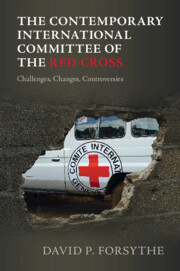Book contents
- The Contemporary International Committee of the Red Cross
- The Contemporary International Committee of the Red Cross
- Copyright page
- Dedication
- Contents
- Photographs
- Preface: Who and Why
- 1 The Contemporary ICRC and Its Critics
- 2 The ICRC and the Global Humanitarian System
- 3 History
- 4 History
- 5 The Red Cross Movement
- 6 The Red Cross Movement
- 7 ICRC Relations with Bern
- 8 ICRC Relations with Bern
- 9 Humanitarians and Business
- 10 Humanitarians and Business
- 11 Interpreting the Mandate
- 12 Interpreting the Mandate
- 13 Has the Traditional Focus Been Lost?
- 14 Has the Traditional Focus Been Lost?
- 15 ICRC Governance and Management
- 16 ICRC Governance and Management
- 17 Conclusion
- 18 Conclusion
- Epilogue
- Annex
- Index
18 - Conclusion
Part II – The Future
Published online by Cambridge University Press: 01 February 2024
- The Contemporary International Committee of the Red Cross
- The Contemporary International Committee of the Red Cross
- Copyright page
- Dedication
- Contents
- Photographs
- Preface: Who and Why
- 1 The Contemporary ICRC and Its Critics
- 2 The ICRC and the Global Humanitarian System
- 3 History
- 4 History
- 5 The Red Cross Movement
- 6 The Red Cross Movement
- 7 ICRC Relations with Bern
- 8 ICRC Relations with Bern
- 9 Humanitarians and Business
- 10 Humanitarians and Business
- 11 Interpreting the Mandate
- 12 Interpreting the Mandate
- 13 Has the Traditional Focus Been Lost?
- 14 Has the Traditional Focus Been Lost?
- 15 ICRC Governance and Management
- 16 ICRC Governance and Management
- 17 Conclusion
- 18 Conclusion
- Epilogue
- Annex
- Index
Summary
The author reviews earlier chapters about the interpretation of the mandate and traditional concerns, concluding that some review and trimming is in order. He believes this is especially so on some matters pertaining to urban “other violence” and also irregular migration. He also believes ICRC “early recovery” programs need clearer limits and at present are not sustainable. The new president from fall 2022 seems open to some changes, which may include revisiting in some ways the nature of the Assembly. A pressing question will remain that of “localization” of the global humanitarian response, and whether Western-based, governed, and financed actors such as the ICRC should yield over time to more local actors when confronting humanitarian concerns. The author believes that, while the quest for a more democratic and less imperial global humanitarian system is good, many have overlooked the importance of what the ICRC has brought to the subject of humanitarian response, namely a reputation for neutrality and appropriate action in conflict situations. These trends are precisely why donors such as the World Bank have continued or even expanded their support for the organization. Similar to Mark Twain, reports of the demise of the ICRC are premature. But that does not mean that all is in order for this oldest of humanitarian actors.
Keywords
- Type
- Chapter
- Information
- The Contemporary International Committee of the Red CrossChallenges, Changes, Controversies, pp. 394 - 408Publisher: Cambridge University PressPrint publication year: 2024

